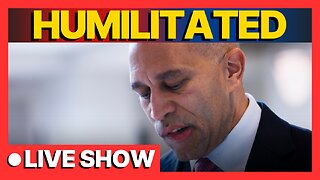Premium Only Content

AA - Tradition 12 - Twelve Steps & Twelve Traditions - Alcoholics Anonymous - Read Along – 12 & 12
Tradition 12 - Twelve Steps & Twelve Traditions - Alcoholics Anonymous - 12 & 12 Read Along
The Life-Changing Twelve Step Solution to Alcoholism
If you or someone you care about is suffering from addiction, there is help available.
Are you trying to stop drinking?
Do you think you may be an alcoholic?
Alcoholics Anonymous has been successful in saving millions of lives and families.
Local meetings can be found online.
Reach out if you would like assistance.
Spiritual principles helping to live your best life without alcohol and drugs.
Recovery from unhealthy habits and creating solutions for a long happy and useful life.
Alcoholism doesn't have to be a death sentence.
Addiction can be fixed.
Interventions and sober coaching
Tradition Twelve
“Anonymity is the spiritual foundation of all our traditions, ever reminding us to place principles before personalities.”
THE spiritual substance of anonymity is sacrifice. Because A.A.'s Twelve Traditions repeatedly ask us to give up personal desires for the common good, we realize that the sacrificial spirit—well symbolized by anonymity—is the foundation of them all. It is A.A.'s proved willingness to make these sacrifices that gives people their high confidence in our future.
But in the beginning, anonymity was not born of confidence; it was the child of our early fears. Our first nameless groups of alcoholics were secret societies. New prospects could find us only through a few trusted friends. The bare hint of publicity, even for our work, shocked us. Though ex-drinkers, we still thought we had to hide from public distrust and contempt.
When the Big Book appeared in 1939, we called it “Alcoholics Anonymous.” Its foreword made this revealing statement: “It is important that we remain anonymous because we are too few, at present, to handle the overwhelming number of personal appeals which may result from this publication. Being mostly business or professional folk, we could not well carry on our occupations in such an event.” Between these lines, it is easy to read our fear that large numbers of incoming people might break our anonymity wide open.
As the A.A. groups multiplied, so did anonymity problems. Enthusiastic over the spectacular recovery of a brother alcoholic, we'd sometimes discuss those intimate and harrowing aspects of his case meant for his sponsor's ear alone. The aggrieved victim would then tightly declare that his trust had been broken. When such stories got into circulation outside of A.A., the loss of confidence in our anonymity promise was severe. It frequently turned people from us. Clearly, every A.A. member's name—and story, too—had to be confidential, if he wished. This was our first lesson in the practical application of anonymity.
With characteristic intemperance, however, some of our newcomers cared not at all for secrecy. They wanted to shout A.A. from the housetops, and did, Alcoholics barely dry rushed about bright-eyed, buttonholing anyone who would listen to their stories. Others hurried to place them selves before microphones and cameras. Sometimes, they got distressingly drunk and let their groups down with a bang. They had changed from A.A. members into A.A. show-offs.
This phenomenon of contrast really set us thinking. Squarely before us was the question “How anonymous should an A.A. member be?” Our growth made it plain that we couldn't be a secret society, but it was equally plain that we couldn't be a vaudeville circuit, either. The charting of a safe path between these extremes took a long time.
As a rule, the average newcomer wanted his family to know immediately what he was trying to do. He also wanted to tell others who had tried to help him—his doctor, his minister, and close friends. As he gained confidence, he felt it right to explain his new way of life to his employer and business associates. When opportunities to be helpful came along, he found he could talk easily about A.A. to almost anyone. These quiet disclosures helped him to lose his fear of the alcoholic stigma, and spread the news of A.A.'s existence in his community. Many a new man and woman came to A.A. because of such conversations. Though not in the strict letter of anonymity, such communications were well within its spirit.
But it became apparent that the word-of-mouth method was too limited. Our work, as such, needed to be publicized. The A.A. groups would have to reach quickly as many despairing alcoholics as they could. Consequently, many groups began to hold meetings which were open to interested friends and the public, so that the average citizen could see for himself just what A.A. was all about. The response to these meetings was warmly sympathetic. Soon, groups began to receive requests for A.A. speakers to ap- pear before civic organizations, church groups, and medical societies. Provided anonymity was maintained on these platforms, and reporters present were cautioned against the use of names or pictures, the result was fine.
Then came our first few excursions into major publicity, which were breathtaking. Cleveland's Plain Dealer articles about us ran that town's membership from a few into hundreds overnight. The news stories of Mr. Rockefeller's dinner for Alcoholics Anonymous helped double our total membership in a year's time. Jack Alexander's famous Saturday Evening Post piece made A.A. a national institution. Such tributes as these brought opportunities for still more recognition. Other newspapers and magazines wanted A.A. stories. Film companies wanted to photograph us. Radio, and finally television, besieged us with requests for appearances. What should we do?
As this tide offering top public approval swept in, we realized that it could do us incalculable good or great harm. Everything would depend upon how it was channeled. We simply couldn't afford to take the chance of letting self-ap- pointed members present themselves as messiahs representing A.A. before the whole public. The promoter instinct in us might be our undoing. If even one publicly got drunk, or was lured into using A.A.'s name for his own purposes, the damage might be irreparable. At this altitude (press, radio, films, and television), anonymity—100 per- cent anonymity—was the only possible answer. Here, principles would have to come before personalities, without exception.
These experiences taught us that anonymity is real humility at work. It is an all-pervading spiritual quality which today keynotes A.A. life everywhere. Moved by the spirit of anonymity, we try to give up our natural desires for personal distinction as A.A. members both among fellow alcoholics and before the general public. As we lay aside these very human aspirations, we believe that each of us takes part in the weaving of a protective mantle which covers our whole Society and under which we may grow and work in unity.
We are sure that humility, expressed by anonymity, is the greatest safeguard that Alcoholics Anonymous can ever have.
-
 1:07:21
1:07:21
The Quartering
2 hours agoPeace Between Ukraine & Russia? Kimmel Meltdown & More layoffs
15.8K7 -
 LIVE
LIVE
Barry Cunningham
3 hours agoBREAKING NEWS: PRESIDENT TRUMP MEETS WITH COMMIE MAMDANI | AND MORE NEWS!
1,859 watching -
 LIVE
LIVE
LadyDesireeMusic
1 hour agoLive Piano Music & Convo | Anti Brain Rot | Make Ladies Great Again | White Pill of the Day
82 watching -
 LIVE
LIVE
StoneMountain64
3 hours agoArc Raiders Making Money and LEVELING Up
111 watching -
 LIVE
LIVE
ReAnimateHer
5 hours agoNell’s Diner Is OPEN… For Your Final Meal
36 watching -
 14:53
14:53
Neil McCoy-Ward
10 hours ago🇦🇺 Australian Censorship Chief SUMMONED For Questioning In USA!!! 🇺🇸
2.64K8 -
![MAHA News [11.21] CDC Changes Vaccine/Autism Website & Pharma Freaks, SNAP = Corporate Welfare](https://1a-1791.com/video/fwe2/88/s8/1/-/-/O/B/--OBz.0kob-small-MAHA-News-11.21.jpg) DVR
DVR
Badlands Media
16 hours agoMAHA News [11.21] CDC Changes Vaccine/Autism Website & Pharma Freaks, SNAP = Corporate Welfare
10.6K6 -
 LIVE
LIVE
The Jimmy Dore Show
1 hour agoTrump Threatens to EXECUTE “Seditious” Dems! Mike Huckabee’s SECRET MEETING w/ Convicted Traitor!
3,089 watching -
 1:23:31
1:23:31
DeVory Darkins
4 hours agoBRUTAL moment Jeffries HUMILIATED by CNBC host regarding Obamacare
166K69 -
 1:03:10
1:03:10
The Quartering
4 hours agoThere's An OnlyFans For Pedos, SNAP Bombshell & Big Annoucement
37.4K39